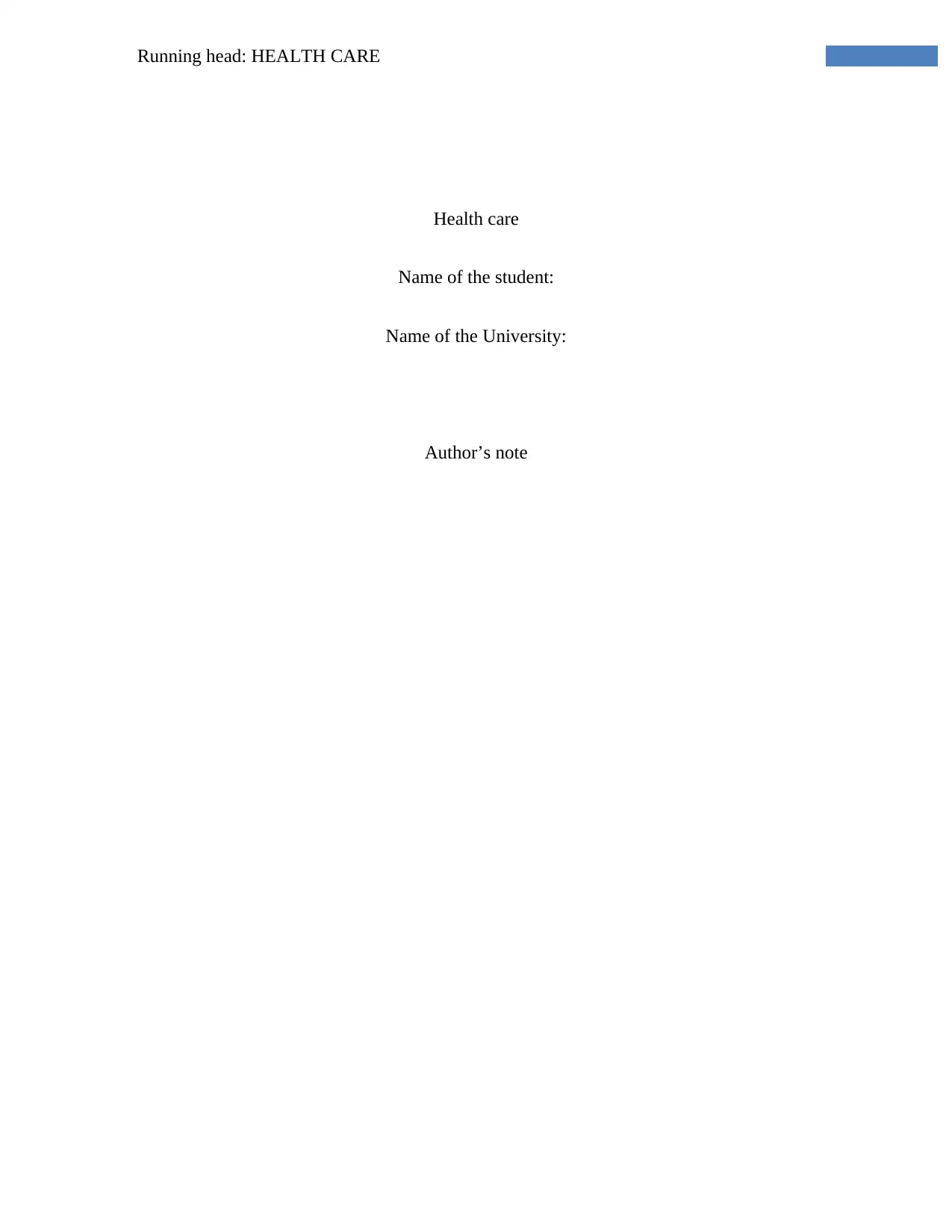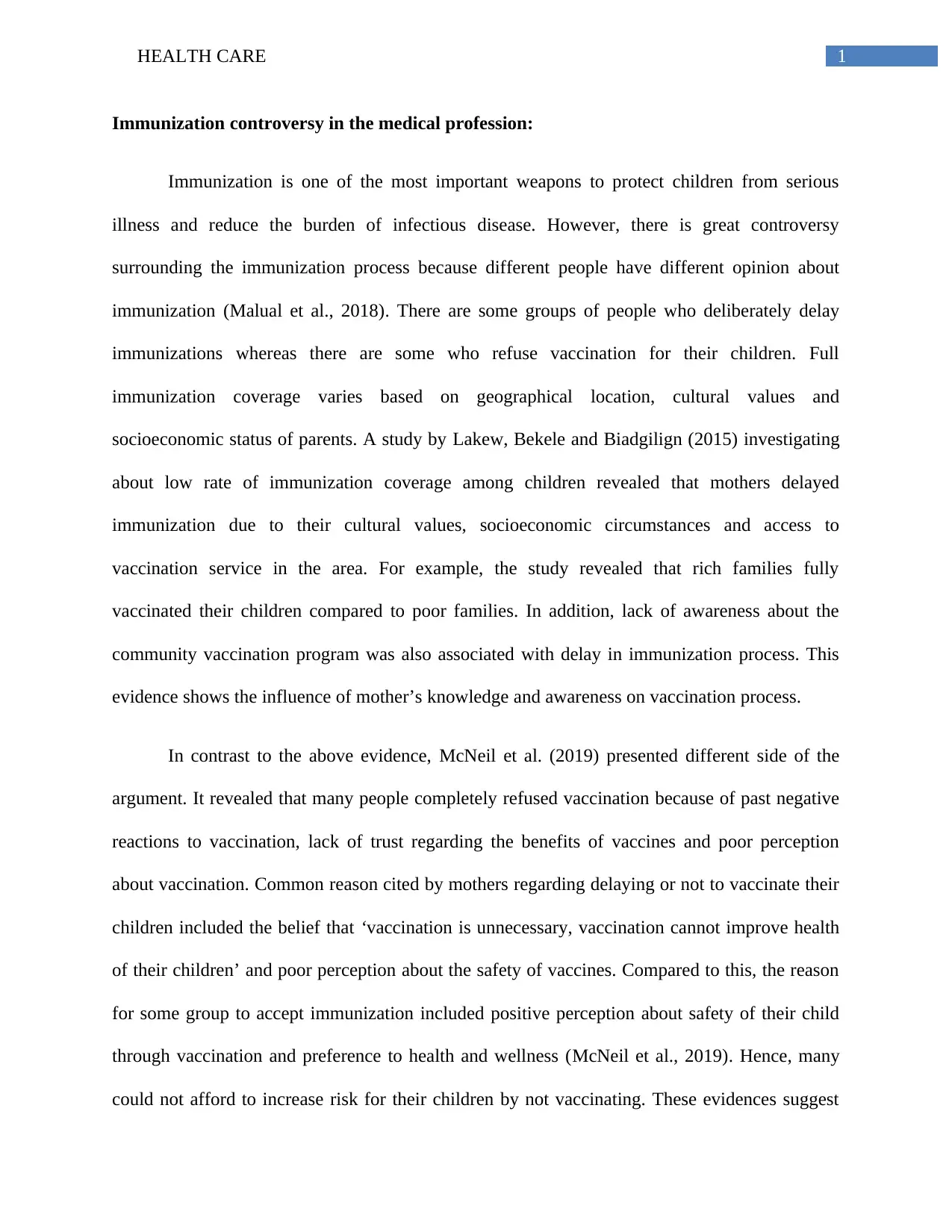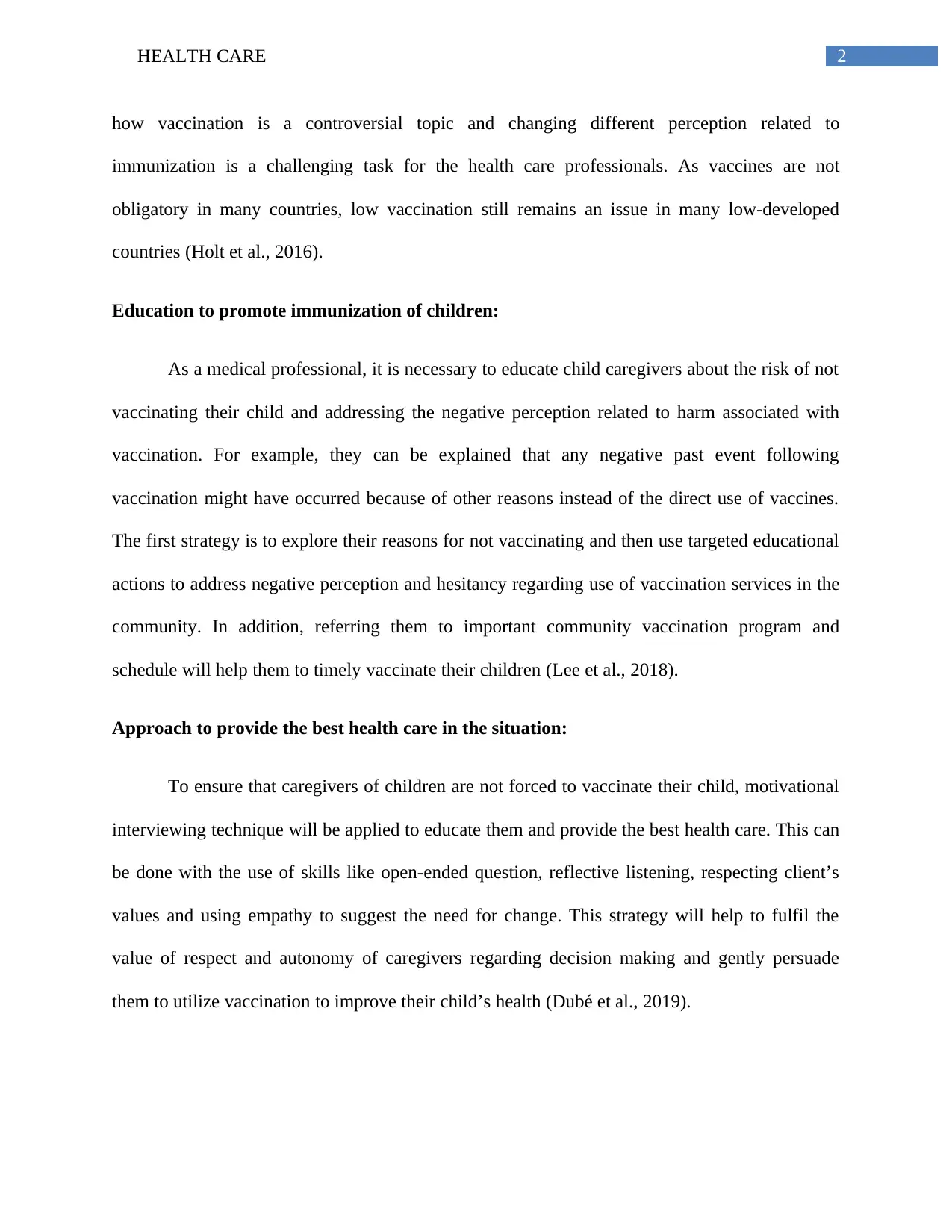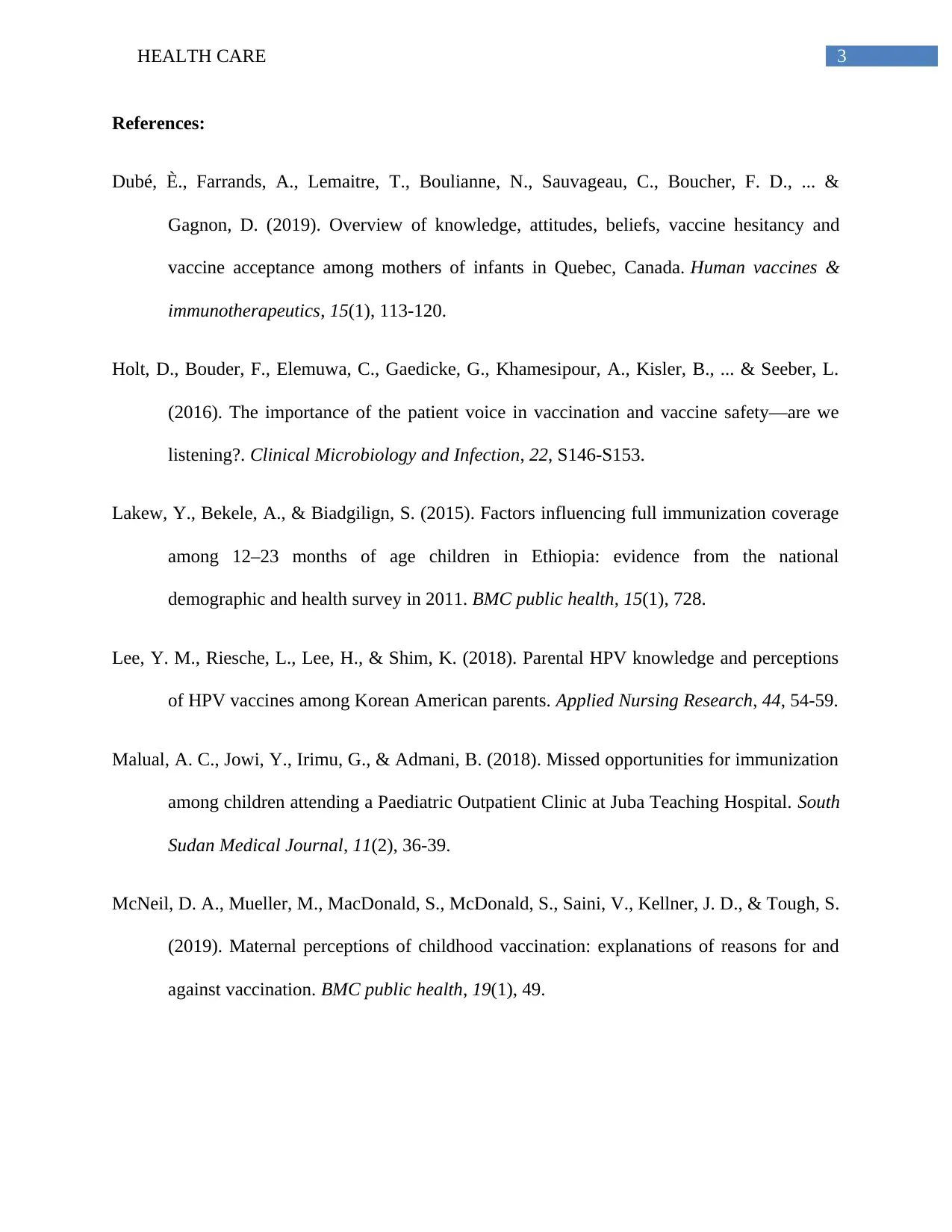University Healthcare Report: Immunization Controversy Analysis
VerifiedAdded on 2022/11/07
|5
|978
|357
Report
AI Summary
This report delves into the controversial topic of immunization within the healthcare field, examining the varying perspectives on vaccination and the factors influencing parental decisions. It explores the reasons behind vaccine hesitancy, including cultural values, socioeconomic status, and concerns about vaccine safety, while also highlighting the importance of immunization in protecting children from serious illnesses. The report emphasizes the need for healthcare professionals to educate child caregivers about the risks of not vaccinating and to address negative perceptions through targeted educational actions and motivational interviewing techniques. It suggests strategies for promoting immunization, such as exploring the reasons for hesitancy, providing accurate information, and respecting caregivers' autonomy to ensure the best healthcare practices.

Running head: HEALTH CARE
Health care
Name of the student:
Name of the University:
Author’s note
Health care
Name of the student:
Name of the University:
Author’s note
Paraphrase This Document
Need a fresh take? Get an instant paraphrase of this document with our AI Paraphraser

1HEALTH CARE
Immunization controversy in the medical profession:
Immunization is one of the most important weapons to protect children from serious
illness and reduce the burden of infectious disease. However, there is great controversy
surrounding the immunization process because different people have different opinion about
immunization (Malual et al., 2018). There are some groups of people who deliberately delay
immunizations whereas there are some who refuse vaccination for their children. Full
immunization coverage varies based on geographical location, cultural values and
socioeconomic status of parents. A study by Lakew, Bekele and Biadgilign (2015) investigating
about low rate of immunization coverage among children revealed that mothers delayed
immunization due to their cultural values, socioeconomic circumstances and access to
vaccination service in the area. For example, the study revealed that rich families fully
vaccinated their children compared to poor families. In addition, lack of awareness about the
community vaccination program was also associated with delay in immunization process. This
evidence shows the influence of mother’s knowledge and awareness on vaccination process.
In contrast to the above evidence, McNeil et al. (2019) presented different side of the
argument. It revealed that many people completely refused vaccination because of past negative
reactions to vaccination, lack of trust regarding the benefits of vaccines and poor perception
about vaccination. Common reason cited by mothers regarding delaying or not to vaccinate their
children included the belief that ‘vaccination is unnecessary, vaccination cannot improve health
of their children’ and poor perception about the safety of vaccines. Compared to this, the reason
for some group to accept immunization included positive perception about safety of their child
through vaccination and preference to health and wellness (McNeil et al., 2019). Hence, many
could not afford to increase risk for their children by not vaccinating. These evidences suggest
Immunization controversy in the medical profession:
Immunization is one of the most important weapons to protect children from serious
illness and reduce the burden of infectious disease. However, there is great controversy
surrounding the immunization process because different people have different opinion about
immunization (Malual et al., 2018). There are some groups of people who deliberately delay
immunizations whereas there are some who refuse vaccination for their children. Full
immunization coverage varies based on geographical location, cultural values and
socioeconomic status of parents. A study by Lakew, Bekele and Biadgilign (2015) investigating
about low rate of immunization coverage among children revealed that mothers delayed
immunization due to their cultural values, socioeconomic circumstances and access to
vaccination service in the area. For example, the study revealed that rich families fully
vaccinated their children compared to poor families. In addition, lack of awareness about the
community vaccination program was also associated with delay in immunization process. This
evidence shows the influence of mother’s knowledge and awareness on vaccination process.
In contrast to the above evidence, McNeil et al. (2019) presented different side of the
argument. It revealed that many people completely refused vaccination because of past negative
reactions to vaccination, lack of trust regarding the benefits of vaccines and poor perception
about vaccination. Common reason cited by mothers regarding delaying or not to vaccinate their
children included the belief that ‘vaccination is unnecessary, vaccination cannot improve health
of their children’ and poor perception about the safety of vaccines. Compared to this, the reason
for some group to accept immunization included positive perception about safety of their child
through vaccination and preference to health and wellness (McNeil et al., 2019). Hence, many
could not afford to increase risk for their children by not vaccinating. These evidences suggest

2HEALTH CARE
how vaccination is a controversial topic and changing different perception related to
immunization is a challenging task for the health care professionals. As vaccines are not
obligatory in many countries, low vaccination still remains an issue in many low-developed
countries (Holt et al., 2016).
Education to promote immunization of children:
As a medical professional, it is necessary to educate child caregivers about the risk of not
vaccinating their child and addressing the negative perception related to harm associated with
vaccination. For example, they can be explained that any negative past event following
vaccination might have occurred because of other reasons instead of the direct use of vaccines.
The first strategy is to explore their reasons for not vaccinating and then use targeted educational
actions to address negative perception and hesitancy regarding use of vaccination services in the
community. In addition, referring them to important community vaccination program and
schedule will help them to timely vaccinate their children (Lee et al., 2018).
Approach to provide the best health care in the situation:
To ensure that caregivers of children are not forced to vaccinate their child, motivational
interviewing technique will be applied to educate them and provide the best health care. This can
be done with the use of skills like open-ended question, reflective listening, respecting client’s
values and using empathy to suggest the need for change. This strategy will help to fulfil the
value of respect and autonomy of caregivers regarding decision making and gently persuade
them to utilize vaccination to improve their child’s health (Dubé et al., 2019).
how vaccination is a controversial topic and changing different perception related to
immunization is a challenging task for the health care professionals. As vaccines are not
obligatory in many countries, low vaccination still remains an issue in many low-developed
countries (Holt et al., 2016).
Education to promote immunization of children:
As a medical professional, it is necessary to educate child caregivers about the risk of not
vaccinating their child and addressing the negative perception related to harm associated with
vaccination. For example, they can be explained that any negative past event following
vaccination might have occurred because of other reasons instead of the direct use of vaccines.
The first strategy is to explore their reasons for not vaccinating and then use targeted educational
actions to address negative perception and hesitancy regarding use of vaccination services in the
community. In addition, referring them to important community vaccination program and
schedule will help them to timely vaccinate their children (Lee et al., 2018).
Approach to provide the best health care in the situation:
To ensure that caregivers of children are not forced to vaccinate their child, motivational
interviewing technique will be applied to educate them and provide the best health care. This can
be done with the use of skills like open-ended question, reflective listening, respecting client’s
values and using empathy to suggest the need for change. This strategy will help to fulfil the
value of respect and autonomy of caregivers regarding decision making and gently persuade
them to utilize vaccination to improve their child’s health (Dubé et al., 2019).
⊘ This is a preview!⊘
Do you want full access?
Subscribe today to unlock all pages.

Trusted by 1+ million students worldwide

3HEALTH CARE
References:
Dubé, È., Farrands, A., Lemaitre, T., Boulianne, N., Sauvageau, C., Boucher, F. D., ... &
Gagnon, D. (2019). Overview of knowledge, attitudes, beliefs, vaccine hesitancy and
vaccine acceptance among mothers of infants in Quebec, Canada. Human vaccines &
immunotherapeutics, 15(1), 113-120.
Holt, D., Bouder, F., Elemuwa, C., Gaedicke, G., Khamesipour, A., Kisler, B., ... & Seeber, L.
(2016). The importance of the patient voice in vaccination and vaccine safety—are we
listening?. Clinical Microbiology and Infection, 22, S146-S153.
Lakew, Y., Bekele, A., & Biadgilign, S. (2015). Factors influencing full immunization coverage
among 12–23 months of age children in Ethiopia: evidence from the national
demographic and health survey in 2011. BMC public health, 15(1), 728.
Lee, Y. M., Riesche, L., Lee, H., & Shim, K. (2018). Parental HPV knowledge and perceptions
of HPV vaccines among Korean American parents. Applied Nursing Research, 44, 54-59.
Malual, A. C., Jowi, Y., Irimu, G., & Admani, B. (2018). Missed opportunities for immunization
among children attending a Paediatric Outpatient Clinic at Juba Teaching Hospital. South
Sudan Medical Journal, 11(2), 36-39.
McNeil, D. A., Mueller, M., MacDonald, S., McDonald, S., Saini, V., Kellner, J. D., & Tough, S.
(2019). Maternal perceptions of childhood vaccination: explanations of reasons for and
against vaccination. BMC public health, 19(1), 49.
References:
Dubé, È., Farrands, A., Lemaitre, T., Boulianne, N., Sauvageau, C., Boucher, F. D., ... &
Gagnon, D. (2019). Overview of knowledge, attitudes, beliefs, vaccine hesitancy and
vaccine acceptance among mothers of infants in Quebec, Canada. Human vaccines &
immunotherapeutics, 15(1), 113-120.
Holt, D., Bouder, F., Elemuwa, C., Gaedicke, G., Khamesipour, A., Kisler, B., ... & Seeber, L.
(2016). The importance of the patient voice in vaccination and vaccine safety—are we
listening?. Clinical Microbiology and Infection, 22, S146-S153.
Lakew, Y., Bekele, A., & Biadgilign, S. (2015). Factors influencing full immunization coverage
among 12–23 months of age children in Ethiopia: evidence from the national
demographic and health survey in 2011. BMC public health, 15(1), 728.
Lee, Y. M., Riesche, L., Lee, H., & Shim, K. (2018). Parental HPV knowledge and perceptions
of HPV vaccines among Korean American parents. Applied Nursing Research, 44, 54-59.
Malual, A. C., Jowi, Y., Irimu, G., & Admani, B. (2018). Missed opportunities for immunization
among children attending a Paediatric Outpatient Clinic at Juba Teaching Hospital. South
Sudan Medical Journal, 11(2), 36-39.
McNeil, D. A., Mueller, M., MacDonald, S., McDonald, S., Saini, V., Kellner, J. D., & Tough, S.
(2019). Maternal perceptions of childhood vaccination: explanations of reasons for and
against vaccination. BMC public health, 19(1), 49.
Paraphrase This Document
Need a fresh take? Get an instant paraphrase of this document with our AI Paraphraser

4HEALTH CARE
1 out of 5
Related Documents
Your All-in-One AI-Powered Toolkit for Academic Success.
+13062052269
info@desklib.com
Available 24*7 on WhatsApp / Email
![[object Object]](/_next/static/media/star-bottom.7253800d.svg)
Unlock your academic potential
Copyright © 2020–2026 A2Z Services. All Rights Reserved. Developed and managed by ZUCOL.





